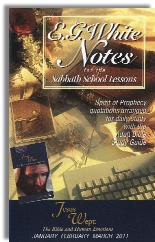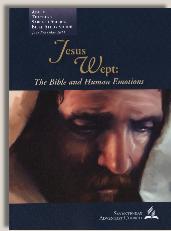|
||||||||||||||
Commentary on "Good Thinking"
Day 3: Monday, January 31, 2011 - Thoughts as a Source of Distress
Overview
Today’s lesson looks at how our thinking can cause the suffering of ourselves and others. The story is told of a woman who feared for her life because a psychic had predicted her death on her 23rd birthday. She died that night from her fear, just before the predicted birthday. The lesson here, we are told, is that we can either suffer from our own negative thoughts, or practice wholesome thinking.
The lesson also emphasizes the importance of how we express our thoughts to others. “Our words can either build up or tear down,” and, “there is life and death in the words we speak.” Ellen White is quoted saying that if we don’t feel lighthearted and joyous, we should not talk of our feelings to others and so cast a shadow on their lives. Otherwise we may drive others away from Christ into the nets of Satan.
Observations
Our words do have great power to build up or tear down others, and Scripture supports this:
“There is one whose rash words are like sword thrusts, but the tongue of the wise brings healing.” Proverbs 12:18
On the Other hand, if we do not feel lighthearted and joyous, should we avoid talking about our feelings? What about the battered wife who desperately needs a wise and empathetic friend to help and encourage? Should persons suffering chronic depression or suicidal thoughts keep a stoic face so they will “cast no shadow upon the lives of others?” Then there are just the ordinary burdens of life that overwhelm us with sadness or guilt; should we never expect others to help us share those burdens? Sometimes, we will delight in being a wet blanket, and it will happen that “misery loves company.” Obviously, good discernment is required here. But do we make a law against speaking about our bad feelings? Paul tells us to,
“Bear one another’s burdens, and so fulfill the law of Christ. For if anyone thinks he is something, when he is nothing, he deceives himself.” Galatians 6:2, 3
Here Paul identifies the primary reason why we don’t want to bear each other’s burdens—pride. When we think highly of ourselves, we don’t like to lower ourselves to empathize with those with problems and moral battles. When we genuinely love and help others in trouble, it humbles us, and reminds us of our own needy condition. It also takes our minds off our own petty self focus.
Pride also keeps us from carrying our burdens to others and asking for empathy, help, or prayer. We would rather keep up the stoic front and try to look self-sufficient. But we are so often “nothing,” for our hearts of pride have again deceived us. When we discourage believers from expressing negative feelings to us, we set up a very prideful, toxic atmosphere. In the family of God, love, humility, and openness reign. The body of Christ is a close-knit family that protects and nurtures its members. When my brother or sister is hurting, I want to know about it. So let us “love one another with brotherly affection,” and “Rejoice with those who rejoice, and weep with those who weep” (Romans 12: 10, 15). That is the law of Christ.
When we don’t belong to Christ or have his Spirit dwelling within us, we do have reason to fear what others might say or do to us. Without Christ, we follow “the prince of the power of the air,” who is “at work in the sons of disobedience.” That young woman could easily believe the psychic (demonic) message that she would die on a certain day. Without Christ, she had no hope.
When the Spirit brings us the Gospel of Christ and gives us ears to hear it, and we believe, nothing will ever be the same again. We are no longer dominated by fear of death, or anything others may say or do to us. When we are tempted to fear, we will not have to rely on our powers of wholesome thought or stoic mind control. We will flee to our Father in Heaven who will never, ever, abandon us.
“For you did not receive the spirit of slavery to fall back into fear, but you have received the Spirit of adoption as sons, by whom we cry, ‘Abba! Father!’ The Spirit himself bears witness with our spirit that we are children of God…” Romans 8:15, 16
Summary
- Instead of discouraging each other from expressing negative feelings, we should use good judgment in love and “bear one another’s burdens.” This fulfills Christ’s law.
- It is pride that prevents us from bearing other’s burdens, or taking our burdens to others for help.
- The body of Christ is a safe place to hurt, a family where love, openness, and humility reign.
- Christ-followers have the Spirit dwelling within them, so they have no fear of what man may say or do.
- When we are adopted by God, the Spirit tells our spirits we belong to Him forever. When we are afraid, we don’t rely on mind control; we cry out for our Daddy!
Copyright 2011 BibleStudiesForAdventists.com. All rights reserved. Revised February 1, 2011. This website is published by Life Assurance Ministries, Camp Verde, Arizona, USA, the publisher of Proclamation! Magazine. Contact email: BibleStudiesForAdventists@gmail.com.
The Sabbath School Bible Study Guide and the corresponding E.G. White Notes are published by Pacific Press Publishing Association, which is owned and operated by the Seventh-day Adventist church. The current quarter's editions are pictured above.
Official Adventist Resources
Standard Edition Study Guide Week 6
Teacher's Edition Study Guide Week 6


